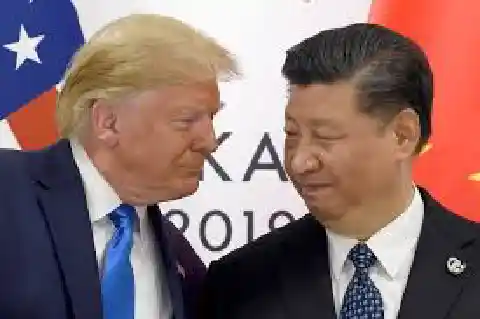Trump Extends Inauguration Invite to Xi Jinping Amid US-China Strains
- Advertisement -
As Donald Trump takes the oath to preserve, protect, and defend the Constitution on the very spot where his supporters rioted four years ago, an extraordinary VIP guest is invited to witness the event. Xi Jinping, the hardline leader of China, is the guest in question—a figure seen by many on the inaugural platform as an existential threat to US superpower dominance in an accelerating 21st-century cold war.
Though sources confirmed on Thursday that Xi would not attend, the mere invitation from Trump is a significant development. It underscores the president-elect’s confidence and ambition as he prepares for his second term. Trump’s invitation to Xi is a striking global statement, even if it was clear from the outset that Xi’s attendance was unlikely.
Securing Xi’s presence would have been a monumental achievement for Trump, but it was politically unfeasible for the Chinese leader. Such a visit would have placed Xi in a position of paying homage to Trump and American might, conflicting with his vision for China’s role as a preeminent global power. Moreover, Xi’s presence would be seen as endorsing a democratic transfer of power, anathema for an autocrat in a one-party state.
- Advertisement -
Despite the lack of a favorable response, Trump’s invitation to Xi highlights his fondness for grand gestures in foreign policy and his willingness to trample diplomatic norms with his unpredictable approach. This move also demonstrates Trump’s belief that his personality alone can forge diplomatic breakthroughs—a strategy that rarely works, as hostile US adversaries make decisions based on national interest rather than personal rapport.
Trump’s invitation to Xi is particularly intriguing given his recent appointments of deeply hawkish figures on China, including Florida Sen. Marco Rubio as Secretary of State and Florida Rep. Mike Waltz as National Security Adviser. Both see China as a multi-front threat to the United States.
“This is a very interesting move by Trump that fits very well with his practice of unpredictability. I don’t think anyone expected this,” said Lily McElwee, deputy director and fellow in the Freeman Chair in China Studies at the Center for Strategic and International Studies (CSIS). McElwee noted that the invitation is a symbolic gesture that disrupts the tone of the relationship without undermining US interests.
- Advertisement -
Trump’s outreach to Xi comes as expectations mount that US-China relations will worsen in the coming administration. The rivals are at odds over Taiwan, and China is increasing its cooperation with other US foes in an informal anti-Western axis alongside Russia, North Korea, and Iran. Air and naval forces of the two main Pacific powers often come dangerously close to clashes in the South and East China seas.
Given Trump’s threats to impose crushing tariffs on China, his attempt to coax Xi to Washington seems contradictory. It raises questions about how seriously US allies and adversaries should take his bullying tone and volatile policy shifts. Is the true American approach characterized by his hardline officials and policies, or by Trump’s head-spinning moves?
Trump’s latest gambit might feel chaotic, but it could potentially work. His unpredictability can tip rivals off balance and open advantages for the US. Any success in peeling Xi away from Iran, Russia, and North Korea would be a significant foreign policy win.
- Advertisement -
However, it’s fair to question whether the fire and fury of Trump’s first-term foreign policy delivered durable results. His views on China are especially confusing—he sees Beijing’s policies as a direct threat to the US but still wants to be friends with Xi. This contradiction was evident in a recent interview with CNBC’s Jim Cramer, where Trump simultaneously discussed positive talks with Xi and lamented how the US has been economically abused.
Trump’s habit of undermining his administration’s tough policy was evident in his first term, especially with strongmen like Xi, Russian President Vladimir Putin, Turkish President Recep Tayyip Erdogan, and North Korea’s Kim Jong Un. Sometimes it seemed he took positions simply because everyone was telling him not to.
One of Trump’s former national security advisers, H.R. McMaster, noted in his book “At War with Ourselves” that Trump was overconfident in his ability to improve relations with dictators like Putin. This contrarianism might be motivating Trump in his early olive branch to Xi.
Trump’s tariff strategy is also in question. Higher prices for imports would be passed on to US consumers, including voters who saw Trump as the best hope of easing high prices for groceries. Analysts are unsure whether Trump’s tariff threats are aimed at negotiating leverage or a genuine act of economic warfare.
Beijing seems to be taking Trump seriously. It has announced an anti-trust investigation against US-based chip maker Nvidia, banned the export of several rare minerals to the US, and pledged to increase the budget deficit to safeguard economic growth against new tensions with Trump.
- Advertisement -
This shows that a trade war could be disastrous for both China and America. While tariffs could send prices higher in the US, they could dry up profits and exacerbate some of China’s biggest economic vulnerabilities.
FA Defends Support for Saudi Arabia’s 2034 World Cup Bid Amid Human Rights Concerns
Trump’s inaugural invitation to Xi looks like an opening chess move in a pan-Pacific great game that will help define his second term. As the world watches, the dynamics of US-China relations will continue to evolve, with significant implications for global politics and economics.
For more updates and detailed coverage, stay tuned to our latest news section.
- Advertisement -


